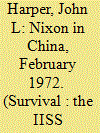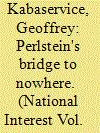| Srl | Item |
| 1 |
ID:
183786


|
|
|
|
|
| Summary/Abstract |
When Richard M. Nixon became president in 1969, US–China relations had been frozen for 20 years. Nixon was well positioned to transform those relations: he enjoyed the confidence of US conservatives, and no one could reasonably accuse him of sympathising with communism. He had developed a realist world view that minimised the importance of ideology and of a state’s domestic system. The time was right for a new approach because China and the Soviet Union had come to see each other as deadly enemies. The US was bogged down in Vietnam and urgently in need of a relaxation of external pressure. Nixon’s visit to China in February 1972 initiated a process of normalisation and a shift in the international power balance decisively in favour of the West. But Nixon did not foresee China’s transformation along democratic lines and considered it a greater threat than the Soviet Union over the long run.
|
|
|
|
|
|
|
|
|
|
|
|
|
|
|
|
| 2 |
ID:
133641


|
|
|
|
|
| Publication |
2014.
|
| Summary/Abstract |
A simplistic attempt to explain the rise of the modern American right
ON A SWELTERING Monday in August 1976, delegates began to arrive at the Kemper Arena in Kansas City, Missouri, for the start of the Republican National Convention. Unlike today's tightly scripted party conventions, which have become little more than four-day infomercials, the outcome of this convention was in serious doubt. The presumptive nominee was President Gerald Ford, who had assumed the office only after the resignations of Spiro Agnew and Richard M. Nixon. His challenger was Ronald Reagan, the conservative former governor of California, who could seize the presidential nomination by winning over a comparative handful of uncommitted delegates. It was a moment of high and historic drama. As Rick Perlstein relates, when the delegates arrived at the arena, they were to be greeted by "what was supposed to be a stirring sight": a fifty-foot, 1,500-pound inflated elephant soaring overhead. Unfortunately, in "classic 1970s fashion," the beast's stomach had been accidentally punctured by its rigging and it now wallowed limply in the parking lot.
|
|
|
|
|
|
|
|
|
|
|
|
|
|
|
|